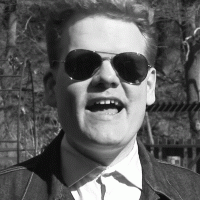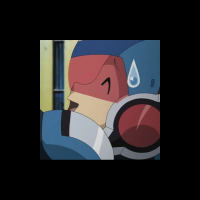Contribuții/Mesaje: 12
Limbă: English
freeze10108 (Arată profil) 30 ianuarie 2011, 18:29:04
My last lesson so far was on superlative and comparisons, and I had a sentence that I though was correct, but my reviewer said was wrong, and I'm confused on the reason why.
My sentence: "De la kvar hundoj, la plej granda estas la orkoloro."
My reviewer corrected "orkoloro" to "orkolora." I asked why it should be an adjective instead of a noun as such:
Mi volis diri ke "la hundo [kiu] estas orkolora" estis la plej granda. Ĉar tiu [frazero] estas substantivo, ĉu devas esti "orkoloro", aŭ povas adjektivo esti subjekto?"I wanted to say that the 'the dog that's golden' is the largest. Because that phrase is a noun, shouldn't it be "orkoloro," or can an adjective serve as a subject?"
I'd like to further my argument by saying that the first phrase "Of the five dogs" is dependent and can't stand on its own, while "The biggest is the golden one," can, and the subject is "the golden one."
He insisted that it must be "orkolora." His reasoning is as such:
Ke kaj kiu estas malsamaj. Ke enkondukas novan frazoparton, sed ne rilatas al la cxefa parto de la frazo. Mi scias, ke sxi estas cxi tie. Estas grave, ke vi iru. Ke havas nur gramatikan signifon.I had trouble translating this very well, as he left off lots of subjects, which I assumed had to be something like "it" or "that," but I wasn't sure.
En via frazo, vi parolas pri la hundo. Temas pri adjektiva frazo-parto, kaj kiu estas bezonata kiel sub-ord-ig-ilo (kiel which en la angla):
La hundo (la hundo estas orkolora) estas la plej granda.
La hundo (kiu estas orkolora) estas la plej granda.
La hundo kiu estas orkolora estas la plej granda
Orkolora estas adjektivo, kiu priskribas "hundo" do gxi bezonas la finajxon -a.
Anyway, could someone help me figure out which is the correct word (or ending, as it were) to use in this sentence?
marcuscf (Arată profil) 30 ianuarie 2011, 19:08:56
On the other hand "la orkolora", means "the golden one". Since it's an article plus an adjective without a following noun, it is implicitly saying: "la orkolora hundo".
There are other situations where a-words can appear without a noun, this often happens with "alia(j)", "multa(j)" and language names, e.g. la angla = la angla lingvo. "La anglo" is a whole different thing, it denotes a person.
rafano (Arată profil) 30 ianuarie 2011, 20:24:13
My sentence: "De la kvar hundoj, la plej granda estas la orkoloro."Your native tongue is English, I take it. In English you would say "the biggest is the golden one", wouldn't you? However, in Esperanto you do not need to do that. I know it wouldn't make much sense if you said only "the biggest is the golden" in English, but this works just fine in Esperanto. Thus, La plej granda estas la orkolora. Orkoloro could in no way mean a golden dog, but only golden colour.
freeze10108 (Arată profil) 30 ianuarie 2011, 21:21:10

Echo49 (Arată profil) 30 ianuarie 2011, 21:53:13
El ĉiuj miaj infanoj Ernesto estas la plej juna.and
El ĉiuj siaj fratoj Antono estas la malplej saĝa.
marcuscf (Arată profil) 30 ianuarie 2011, 23:06:16
freeze10108 (Arată profil) 30 ianuarie 2011, 23:23:10
Echo49:Should "de" be replaced with "el"?That makes sense. The dictionary defines "de" as an "of" meaning "from" (like a direction), "by," or "since," while it defines "el" as "from" or "out of." Thanks for catching it; my Spanish must be influencing me along with my English.

erinja (Arată profil) 31 ianuarie 2011, 01:51:13
rafano (Arată profil) 31 ianuarie 2011, 05:43:44
freeze10108:Yeah, I was trying to say "the golden one," but I didn't really know how to express it in Esperanto. Anyway, it makes sense now that it should be an adjective. I'm not really sure if I can express why it makes sense in English, but it makes sense. Thanks guys!The reason why it makes sense in English is that the meaning would be altered if you left the word one out here. In English, unless anything else is mentioned, plural is default when you use adjectives without having any nouns after them. So, if you are talking about merely the elderly, the young, the poor and so on, those who listen to you would take for granted that you refer to many people. If you want to be more precise and tell that you are referring just to one individual, you have to use the word one as a complement.
However, in Esperanto other things than such default notions indicate whether you are referring to single individuals or a group of individuals. The left out one of English is here compensated by something grammarians call agreement. This means that you can tell from the form of the adjective what it refers to. In this case, orkolora refers to hundo. (Orkoloran would refer to hundon and orkoloraj to hundoj etc.)
ceigered (Arată profil) 31 ianuarie 2011, 06:00:14
erinja:The word "el" should definitely be used in this case instead of "de", so that is certainly an error that your tutor didn't catch.Being Livemocha there should be just multiple reviewers - e.g. if you know the language you can add suggestions about the student's work.
Anyway I'd go for
"El la kvar hundoj, la plej granda estas la orkolora"
or
"La orkolora hundo el la kvar hundoj estas la plej granda
etc




